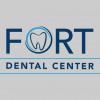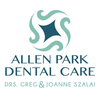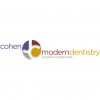Our team is committed to providing gentle dentistry in Lincoln Park, MI to help patients feel comfortable and confident in their smile. From cleanings and examinations for kids to advanced periodontal treatments, Dr. Galayda and Dr. Shackleford offer comprehensive dental care, personalized to each unique individual. Located on the corner of Fort Park and Champaign, The Dental Clinic is proud to serve Downriver families with dental care they can trust!
At The Dental Clinic, you and your loved one are part of our family. We build long-lasting relationships with our patients and earn their trust by providing comfortable and effective treatments, being honest, and valuing their time. From bringing your youngest child in for an introductory visit to seeking restorative care for an elderly parent, our family dental practice is here to help.
By offering a wide range of preventive, cosmetic, orthodontic, and restorative treatment services, as well as advanced periodontal care, every member of your family, can receive the personalized care they need when they need it.
At The Dental Clinic, you and your loved one are part of our family. We build long-lasting relationships with our patients and earn their trust by providing comfortable and effective treatments, being honest, and valuing their time. From bringing your youngest child in for an introductory visit to seeking restorative care for an elderly parent, our family dental practice is here to help.
By offering a wide range of preventive, cosmetic, orthodontic, and restorative treatment services, as well as advanced periodontal care, every member of your family, can receive the personalized care they need when they need it.
Services
There are many types of filling materials available, each with their own advantages and disadvantages.
You and your dentist can discuss the best options for restoring your teeth.
Composite fillings, along with silver amalgam fillings, are the most widely used today.
Because composite fillings are tooth colored, they can be closely matched to the color of existing teeth, and are more aesthetically suited for use in front teeth or more visible areas of the mouth.
As with most dental restorations, composite fillings are not permanent and may someday have to be replaced.
You and your dentist can discuss the best options for restoring your teeth.
Composite fillings, along with silver amalgam fillings, are the most widely used today.
Because composite fillings are tooth colored, they can be closely matched to the color of existing teeth, and are more aesthetically suited for use in front teeth or more visible areas of the mouth.
As with most dental restorations, composite fillings are not permanent and may someday have to be replaced.
Once your periodontal treatment has been completed, your dentist and dental hygienist will recommend that you have regular maintenance cleanings (periodontal cleanings), usually four times a year.
At these cleaning appointments, the pocket depths will be carefully checked to ensure that they are healthy.
Plaque and calculus that is difficult for you to remove on a daily basis will be removed from above and below the gum line.
Examination of diagnostic x-rays (radiographs): Essential for detection of decay, tumors, cysts, and bone loss.
At these cleaning appointments, the pocket depths will be carefully checked to ensure that they are healthy.
Plaque and calculus that is difficult for you to remove on a daily basis will be removed from above and below the gum line.
Examination of diagnostic x-rays (radiographs): Essential for detection of decay, tumors, cysts, and bone loss.
A preventive program is a cooperative effort by the patient, dentist, and dental staff to preserve the natural dentition and supporting structures by preventing the onset, progress, and recurrence of dental diseases and conditions.
Preventing dental disease starts at home with good oral hygiene and a balanced diet.
It is continued in the dental office by the efforts of your dentist and dental hygienist to promote, restore, and maintain your oral health.
Prevention helps avoid serious and costly dental problems and is the key to having a healthy, confident, beautiful smile.
Preventing dental disease starts at home with good oral hygiene and a balanced diet.
It is continued in the dental office by the efforts of your dentist and dental hygienist to promote, restore, and maintain your oral health.
Prevention helps avoid serious and costly dental problems and is the key to having a healthy, confident, beautiful smile.
Topical fluoride strengthens the teeth once they have erupted by seeping into the outer surface of the tooth enamel, making the teeth more resistant to decay.
We gain topical fluoride by using fluoride containing dental products such as toothpaste, mouth rinses, and gels.
Dentists and dental hygienists generally recommend that children have a professional application of fluoride twice a year during dental check-ups.
Systemic fluoride strengthens the teeth that have erupted as well as those that are developing under the gums.
We gain topical fluoride by using fluoride containing dental products such as toothpaste, mouth rinses, and gels.
Dentists and dental hygienists generally recommend that children have a professional application of fluoride twice a year during dental check-ups.
Systemic fluoride strengthens the teeth that have erupted as well as those that are developing under the gums.
Tooth brushing - Brush your teeth at least twice a day (especially before going to bed at night) with an ADA approved soft bristle brush and toothpaste.
Place the brush at a 45-degree angle to the gums and gently brush using a small, circular motion, ensuring that you always feel the bristles on the gums.
Electric toothbrushes are also recommended.
They are easy to use and can remove plaque efficiently.
Simply place the bristles of the electric brush on your gums and teeth and allow the brush to do its job, several teeth at a time.
Place the brush at a 45-degree angle to the gums and gently brush using a small, circular motion, ensuring that you always feel the bristles on the gums.
Electric toothbrushes are also recommended.
They are easy to use and can remove plaque efficiently.
Simply place the bristles of the electric brush on your gums and teeth and allow the brush to do its job, several teeth at a time.
Reviews

Be the first to review The Dental Clinic.
Write a Review


